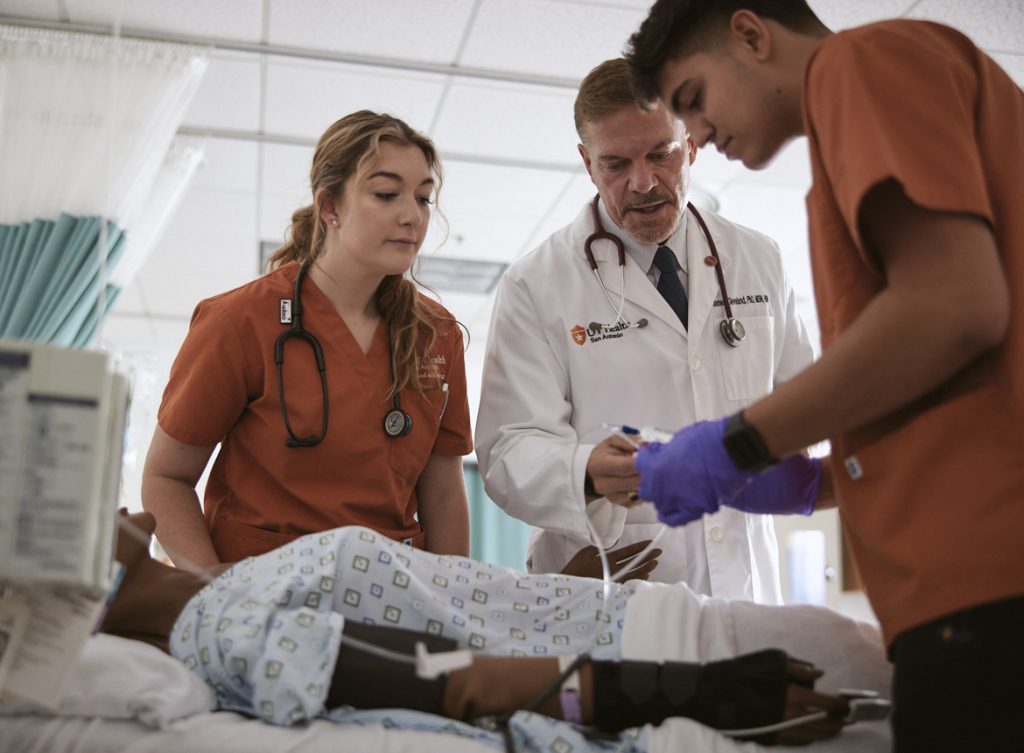Sponsored by:
South Texas has one of the greatest shortages of physicians, nurses and dentists in the state. The Texas Department of State Health Services estimates physicians in more than 30 medical specialties will reach critical shortage levels in the next 10 years, while the region’s current shortage of full-time nurses is expected to double by 2030. Additionally, there are 68% fewer dentists per capita in South Texas than the national average.
The University of Texas Health Science Center at San Antonio (UT Health San Antonio) is taking proactive steps to address health care workforce shortages and tailor much of its work to the care needs of the South Texas area.
Never miss San Antonio Report’s biggest stories.
Sign up for The Recap, a newsletter rundown of the most important news, delivered every Monday and Thursday.
“UT Health San Antonio’s programs and pipeline initiatives are a cornerstone of our commitment to transforming health care in South Texas,” said Robert A. Hromas, M.D., FACP, dean of the university’s Long School of Medicine.
Educating the workforce of tomorrow
UT Health San Antonio has graduated 43,771 health professionals since opening its doors in 1968. The institution blends holistic education, cutting-edge research and community-focused training to transform its students into trusted health professionals, many of whom choose to live and work in South Texas.
Finding and recruiting top students for UT Health San Antonio begins as early as high school, with several programs that assist students in learning more about careers in health care and biomedical sciences. Outreach initiatives include campus visits or daylong, weeklong and longitudinal programs, said Irene Chapa, Ph.D., executive director of recruitment and science outreach and director of the Voelcker Biomedical Research Academy and South Texas Undergraduate Research Opportunities Program.
“UT Health San Antonio’s Office of Recruitment and Science Outreach engages over 15,000 [high school and early college] students and educators annually, assisting students in discerning if a future in the health professions or biomedical sciences is for them and empowering them to make their career dreams a reality,” she said.
UT Health San Antonio’s Office of Recruitment and Science Outreach programs include:
- The Max and Minnie Tomerlin Voelcker Fund Biomedical Research Academy is a three-year program for San Antonio high school students to engage in biomedical research, education and college preparation with mentorship from university scientists.
- The Biomedical Excellence and Academic Training Academy immerses high school students in hands-on activities, seminars and college preparatory sessions related to medical research and health careers.
- South Texas Area Health Education Centers programs engage students from high school through early college in health care careers through activities like camps, internships and introduction to various health disciplines.
Throughout the university are other programs that help prepare undergraduate students for success in medical, dental or nursing school. These include:
- The Joint Admission Medical Program offered through the Joe R. and Teresa Lozano Long School of Medicine includes summer internships and Medical College Admission Test entrance exam tutoring to prepare highly qualified students for medical school.
- Summer Undergraduate Nursing Research Immersion Experience and New Horizons programs through the School of Nursing provide undergraduate nursing students with hands-on research opportunities.
- Learning Enhancement for Achievement in Dentistry and Building our Leaders in Dentistry programs through the School of Dentistry offer support and mentorship as students prepare for dental school.
Instilling innovation and collaboration
UT Health San Antonio offers more than 59 academic programs across its six schools ranging from dental hygiene to occupational therapy to public health. Once enrolled, students can engage with more than 2,400 globally recognized scientists and clinicians.
This integrated and advanced medical education better prepares students to be leaders in the health care and bioscience industries, said Jacqueline Lee Mok, Ph.D., vice president for academic, faculty and student affairs.
“As a comprehensive academic health center, UT Health San Antonio’s degree and certificate programs focus on education for the health professions and biomedical sciences, from the undergraduate to post-professional level,” she said. “Taught by outstanding faculty, our students are immersed in clinical and research environments that complement their academic coursework. This specialized education prepares our students to become the next generation of leaders in the health care professions and biomedical sciences.”
Creating a bright future for health care
For nearly 60 years, UT Health San Antonio has been recognized as a worldwide leader in biomedical education and research. As the largest academic research institution in South Texas, the university is a primary driver of San Antonio’s largest economic generator, its $44.1 billion health care and biosciences sector.
“By equipping future health care leaders with cutting-edge education and training, we are not only advancing medical innovation, but also ensuring that the people of San Antonio and the surrounding communities receive world-class care,” Hromas said.
As the South Texas area grows and changes, the university is growing with it. UT Health San Antonio is on a historic trajectory with nearly $1 billion in capital investments planned within the next 24-48 months. It is also on a path to join with The University of Texas at San Antonio as one premier global university in August 2025. The collective academic, research and clinical strengths of both institutions will create the third-largest research university in Texas.
The University of Texas Health Science Center at San Antonio (UT Health San Antonio) is one of the country’s leading health science universities and is designated as a Hispanic-Serving Institution by the U.S. Department of Education. With missions of teaching, research, patient care and community engagement, its schools of medicine, nursing, dentistry, health professions, graduate biomedical sciences and public health have graduated more than 43,771 alumni who are leading change, advancing their fields and renewing hope for patients and their families throughout South Texas and the world. To learn about the many ways “We make lives better,” visit news.uthscsa.edu.









